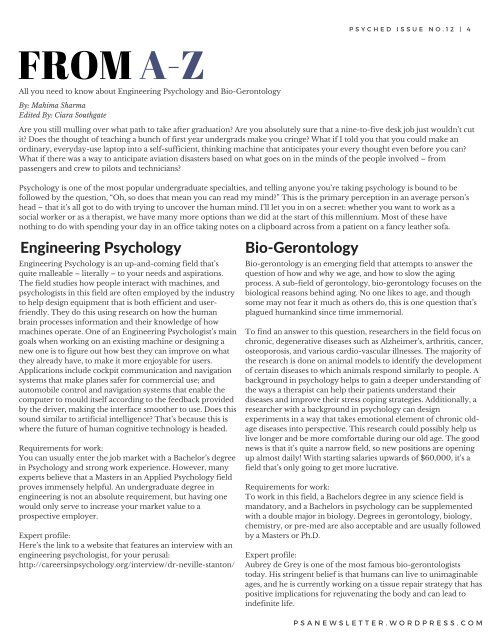P S Y C H E D
VV4of
VV4of
You also want an ePaper? Increase the reach of your titles
YUMPU automatically turns print PDFs into web optimized ePapers that Google loves.
FROM A-Z<br />
All you need to know about Engineering Psychology and Bio-Gerontology<br />
By: Mahima Sharma<br />
Edited By: Ciara Southgate<br />
Are you still mulling over what path to take after graduation? Are you absolutely sure that a nine-to-five desk job just wouldn’t cut<br />
it? Does the thought of teaching a bunch of first year undergrads make you cringe? What if I told you that you could make an<br />
ordinary, everyday-use laptop into a self-sufficient, thinking machine that anticipates your every thought even before you can?<br />
What if there was a way to anticipate aviation disasters based on what goes on in the minds of the people involved – from<br />
passengers and crew to pilots and technicians?<br />
Psychology is one of the most popular undergraduate specialties, and telling anyone you’re taking psychology is bound to be<br />
followed by the question, “Oh, so does that mean you can read my mind?” This is the primary perception in an average person’s<br />
head – that it’s all got to do with trying to uncover the human mind. I’ll let you in on a secret: whether you want to work as a<br />
social worker or as a therapist, we have many more options than we did at the start of this millennium. Most of these have<br />
nothing to do with spending your day in an office taking notes on a clipboard across from a patient on a fancy leather sofa.<br />
Engineering Psychology<br />
Engineering Psychology is an up-and-coming field that’s<br />
quite malleable – literally – to your needs and aspirations.<br />
The field studies how people interact with machines, and<br />
psychologists in this field are often employed by the industry<br />
to help design equipment that is both efficient and userfriendly.<br />
They do this using research on how the human<br />
brain processes information and their knowledge of how<br />
machines operate. One of an Engineering Psychologist’s main<br />
goals when working on an existing machine or designing a<br />
new one is to figure out how best they can improve on what<br />
they already have, to make it more enjoyable for users.<br />
Applications include cockpit communication and navigation<br />
systems that make planes safer for commercial use; and<br />
automobile control and navigation systems that enable the<br />
computer to mould itself according to the feedback provided<br />
by the driver, making the interface smoother to use. Does this<br />
sound similar to artificial intelligence? That’s because this is<br />
where the future of human cognitive technology is headed.<br />
Requirements for work:<br />
You can usually enter the job market with a Bachelor’s degree<br />
in Psychology and strong work experience. However, many<br />
experts believe that a Masters in an Applied Psychology field<br />
proves immensely helpful. An undergraduate degree in<br />
engineering is not an absolute requirement, but having one<br />
would only serve to increase your market value to a<br />
prospective employer.<br />
Expert profile:<br />
Here’s the link to a website that features an interview with an<br />
engineering psychologist, for your perusal:<br />
http://careersinpsychology.org/interview/dr-neville-stanton/<br />
Bio‐Gerontology<br />
Bio-gerontology is an emerging field that attempts to answer the<br />
question of how and why we age, and how to slow the aging<br />
process. A sub-field of gerontology, bio-gerontology focuses on the<br />
biological reasons behind aging. No one likes to age, and though<br />
some may not fear it much as others do, this is one question that’s<br />
plagued humankind since time immemorial.<br />
To find an answer to this question, researchers in the field focus on<br />
chronic, degenerative diseases such as Alzheimer’s, arthritis, cancer,<br />
osteoporosis, and various cardio-vascular illnesses. The majority of<br />
the research is done on animal models to identify the development<br />
of certain diseases to which animals respond similarly to people. A<br />
background in psychology helps to gain a deeper understanding of<br />
the ways a therapist can help their patients understand their<br />
diseases and improve their stress coping strategies. Additionally, a<br />
researcher with a background in psychology can design<br />
experiments in a way that takes emotional element of chronic oldage<br />
diseases into perspective. This research could possibly help us<br />
live longer and be more comfortable during our old age. The good<br />
news is that it’s quite a narrow field, so new positions are opening<br />
up almost daily! With starting salaries upwards of $60,000, it’s a<br />
field that’s only going to get more lucrative.<br />
Requirements for work:<br />
To work in this field, a Bachelors degree in any science field is<br />
mandatory, and a Bachelors in psychology can be supplemented<br />
with a double major in biology. Degrees in gerontology, biology,<br />
chemistry, or pre-med are also acceptable and are usually followed<br />
by a Masters or Ph.D.<br />
Expert profile:<br />
Aubrey de Grey is one of the most famous bio-gerontologists<br />
today. His stringent belief is that humans can live to unimaginable<br />
ages, and he is currently working on a tissue repair strategy that has<br />
positive implications for rejuvenating the body and can lead to<br />
indefinite life.


